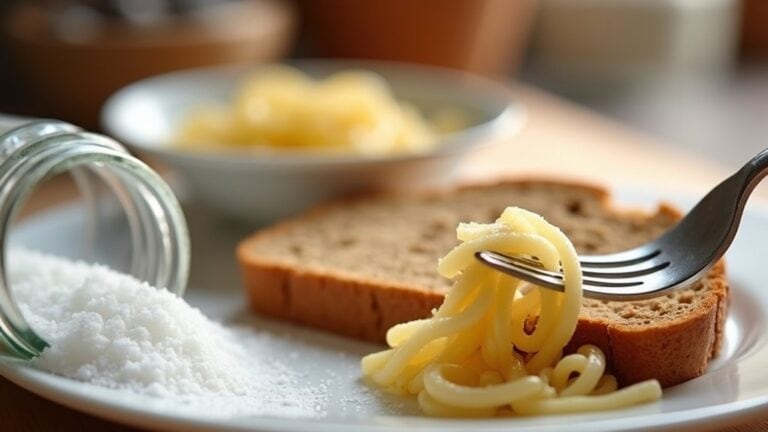Should you’ve ever faced the discomfort of bladder stones, you know how frustrating they can be. Luckily, there are simple home remedies that can help you find relief and manage your symptoms. From staying hydrated to adjusting your diet, you have the power to tackle this issue naturally. Let’s examine six effective strategies that could just make a difference in how you feel. Trust me, these tips could change the way you handle your bladder health.
Stay Hydrated
In terms of maintaining your bladder health, staying hydrated plays a vital role in avoiding bladder stones. Consuming at least 2–3 liters of water daily dilutes stone-forming substances in your urine, notably reducing the likelihood of stones developing.
Aim for pale yellow urine as an indicator of proper hydration; dark yellow signals dehydration and possible issues. Higher fluid intake not only aids in eliminating small crystals but also stops them from growing into larger stones.
Think about mixing lemon juice into your water for a flavorful variation that might aid in preventing calcium-based stones. Keep in mind, sugary and caffeinated drinks can dehydrate you, so opt for water and other hydrating beverages for optimal outcomes.
Increase Citric Acid Intake
To help prevent bladder stones, increasing your citric acid intake can be a game changer.
Citrus fruits, like lemons, pack a powerful punch through enhancing urinary citrate levels, which stops calcium from forming those pesky stones.
Mixing half a cup of lemon juice with water daily is an easy and invigorating way to maintain your urine citric acid-rich!
Benefits of Citrate Intake
Citrate intake offers numerous benefits for your urinary health, and it’s easier to incorporate than you could picture. Through increasing your citrate levels, you can markedly reduce your kidney stone risk. Citrate binds with calcium in your urine, preventing harmful crystallization. For a quick lift, try adding lemon juice to your water, which can raise your urinary citrate levels. Additionally, potassium citrate supplements can cut stone recurrence by up to 50% for those prone to calcium oxalate stones. Keep in mind, low citrate excretion—known as hypocitraturia—can amplify your stone risk.
| Source | Benefit | Recommendation |
|---|---|---|
| Lemon Juice | Natural citrate source | Add 4 oz to water daily |
| Potassium Citrate | Reduces stone recurrence | Consult a doctor for dosage |
| High Citrate Levels | Inhibits crystallization | Aim for balanced intake |
| Good Hydration | Improves urinary function | Drink plenty of fluids |
| Regular Check-Ups | Monitors citrate levels | Schedule routine kidney checks |
Citrus Fruits Options
Citrus fruits can be a pleasant way to improve your urinary health while enjoying some tasty snacks. Lemons, limes, and oranges are rich in citric acid, which binds with urinary calcium and helps prevent stone formation.
Whenever you add about ½ cup of fresh lemon juice or concentrate to your water each day, you can markedly increase your urinary citrate levels. This rise in citrate excretion can inhibit calcium oxalate crystallization, slowing stone growth up to 50%.
For kidney stone patients, studies show that drinking four glasses of lemonade daily raises citrate levels by 45%.
Plus, optimizing citrate from citrus assists in alkalizing your urine, reducing the risk of pesky uric acid stones. Enjoying citrus is both delicious and functional!
Incorporating Lemon Juice
When it comes to combating bladder stones, incorporating lemon juice into your diet can be a substantial breakthrough. This tart beverage is abundant in citrate, which attaches to calcium in your urine, markedly lowering the risk of calcium-based stones.
Target approximately 4 ounces of pure lemon juice daily; this minor adjustment can slash recurring stones up to 90%!
To maintain hydration, blend lemon juice with water—try half a cup of juice in two liters of water. This mixture enhances your hydration while supplying a potent dose of citrate for stone prevention.
Moreover, citric acid can even break down small uric acid stones by alkalizing your urine. So, savor that vibrant lemon flavor while managing your bladder health!
Limit High-Oxalate Foods
In the context of managing bladder stones, reducing high-oxalate foods can have a notable impact. Foods such as spinach, almonds, and beets can lead to bladder stone formation in case you consume them in large amounts. Limiting your intake of additional oxalate-rich foods like chocolate and sweet potatoes is also advisable. Keep in mind, preparing high-oxalate vegetables can lower their oxalate content up to 50%. Here’s a convenient table to illustrate some typical high-oxalate foods:
| High-Oxalate Foods | Tips to Reduce Oxalate |
|---|---|
| Spinach | Cook before eating |
| Almonds | Limit portion sizes |
| Beets | Pair with calcium-rich foods |
Ensure Adequate Calcium Intake
To keep your bladder stones at bay, it’s crucial to guarantee you’re getting enough calcium in your diet. Aim for 1,000 to 1,200 mg a day from foods like milk, cheese, and yogurt, since these can help bind oxalate in your gut and reduce its absorption.
Balancing your calcium intake can make a big difference in your kidney health, so let’s examine how to incorporate these nutritious foods into your meals!
Calcium Sources to Consider
Making sure you get enough calcium is essential to supporting your general health and preventing bladder stones. Great sources include dairy products like milk, yogurt, and cheese, which provide about 300–400 mg of calcium per serving.
Should you prefer leafy greens, enjoy kale and collard greens, offering 90–250 mg per cup. Fortified plant-based milks like almond, soy, and oat usually contain 300–450 mg of calcium per cup, which is a tasty dairy alternative.
Don’t forget about canned salmon with bones; you’ll get 180–250 mg of calcium in just a 3-oz serving!
Finally, calcium-set tofu is another good choice, providing 200–400 mg per ½-cup serving. These options can fit right into your diet and help you maintain healthy calcium levels!
Importance of Dietary Balance
While you mightn’t realize it, achieving a balanced diet is vital for keeping your bladder healthy, particularly as it relates to calcium intake.
Sufficient dietary calcium is critical because it binds with oxalates in your gut, preventing calcium oxalate kidney stones. Here’s how you can maintain a healthy balance:
- Aim for 1,000–1,200 mg of dietary calcium daily from sources like dairy and leafy greens.
- Consume calcium-rich meals alongside oxalate-containing foods to limit oxalate absorption.
- Avoid calcium supplements unless recommended by a healthcare professional, as they can increase the risk of forming stones.
Reduce Salt Intake
Salt plays a sneaky role in our diets, often hiding in the processed foods we consume daily. Reducing your sodium intake is crucial, as a high intake can lead to increased calcium excretion, heightening your risk of kidney stones.
Processed foods account for about 75% of your daily dietary sodium. Instead, reach for fresh foods to help lower your salt consumption. Check nutrition labels diligently and aim for less than 5% DV sodium per serving.
Following the DASH diet can be beneficial too, as it lowers calcium oxalate saturation in urine through 35%.
Keep in mind, each 1,000 mg increase in sodium correlates with a 12% higher stone recurrence rate, so taking control of your salt intake can make a significant difference.
Monitor Protein Intake
Whenever it comes to maintaining your bladder health, keeping an eye on protein intake can make a notable difference. A high intake of animal protein, especially over 50g daily, can considerably raise your bladder stone risk.
Here are some tips to help you manage your protein consumption:
- Limit red meat, poultry, and seafood to under 6oz per day to reduce purines and prevent uric acid stone formation.
- Swap 1–2 servings of animal protein for plant-based alternatives like lentils or tofu to lower urinary oxalate levels.
- Aim to keep your total protein intake moderate, as exceeding 90g doubles your chances of calcium oxalate stone formation.
Making these adjustments can help safeguard your bladder health while enjoying a balanced diet.




